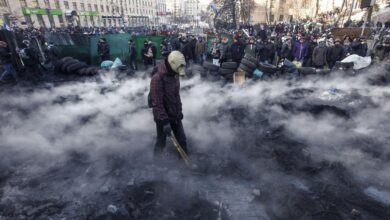What if South Korea Got a Nuclear Bomb?
What if South Korea got a nuclear bomb? It’s a question that sends ripples through the geopolitical landscape, a scenario that forces us to confront complex realities and potential consequences. Imagine the seismic shift in power dynamics across Northeast Asia – the impact on relations with North Korea, the reactions of China and Japan, and the inevitable recalibration of the US alliance.
This isn’t just a hypothetical; it’s a chilling possibility with far-reaching implications for global stability.
The ramifications extend far beyond international relations. Domestically, South Korea would face a complete upheaval. Public opinion would be sharply divided, political parties would scramble to adjust their platforms, and the very fabric of South Korean society could be irrevocably altered. Economically, the cost of developing and maintaining a nuclear arsenal would be astronomical, diverting resources from other vital sectors and potentially impacting foreign investment.
The international legal and treaty implications are equally daunting, with potential sanctions and diplomatic isolation looming large. Ultimately, the question isn’t just
-if* South Korea could acquire nuclear weapons, but
-should* it, and at what cost?
Geopolitical Implications of South Korean Nuclear Weaponization
The hypothetical acquisition of nuclear weapons by South Korea would dramatically reshape the geopolitical landscape of Northeast Asia, triggering a complex web of responses and potentially destabilizing the region. The implications extend far beyond the Korean Peninsula, impacting global security dynamics and power balances. This scenario necessitates a careful examination of its potential effects on key regional players and international relations.
Impact on Relations with North Korea, What if south korea got a nuclear bomb
A nuclear-armed South Korea would fundamentally alter the power dynamic on the Korean Peninsula. While the current situation is characterized by a significant military imbalance favoring the South, the introduction of nuclear weapons would introduce a new element of mutually assured destruction (MAD). This could potentially deter North Korea from further aggressive actions, or conversely, escalate tensions and lead to a more unpredictable security environment.
The potential for miscalculation and accidental escalation would be significantly heightened. History provides examples of how the introduction of nuclear weapons into a region can dramatically alter the strategic calculus, as seen in the Cold War between the US and USSR. A nuclear-armed South Korea could lead to a heightened arms race on the peninsula, with North Korea seeking to enhance its own nuclear capabilities to maintain a deterrent.
Impact on Relations with China
China’s reaction to a South Korean nuclear program would be multifaceted. While China publicly advocates for denuclearization of the Korean Peninsula, its primary concern would likely be the potential for increased US military presence in the region and the destabilization of its strategic backyard. China might increase its military presence in the region as a countermeasure, potentially leading to an escalation of tensions between China and both South Korea and the United States.
Thinking about the implications of a nuclear-armed South Korea is pretty wild; the geopolitical shift would be monumental. It makes you wonder about the reliability of systems we take for granted, like the security of our elections – I just read about issues with voting machines on election day, as reported here: officials in multiple states report issues with voting machines on election day.
If something as fundamental as voting can have glitches, it highlights how fragile even seemingly stable systems can be, especially when considering the potential chaos of a nuclear South Korea.
China’s response could range from diplomatic pressure and sanctions to military exercises and increased support for North Korea. This mirrors China’s past cautious responses to regional shifts in military power, such as the increased US military presence in the South China Sea.
Impact on Relations with Japan
Japan, already possessing a strong military and advanced defense technologies, would likely view a South Korean nuclear program with a mix of concern and cautious acceptance. While sharing concerns about regional stability, Japan might also see a nuclear-armed South Korea as a potential counterweight to North Korea’s nuclear arsenal. However, this could also trigger concerns within Japan about the proliferation of nuclear weapons in the region and the potential for an escalation of the arms race.
Japan’s response might involve strengthening its own defense capabilities and closer cooperation with the US. The historical context of Japan’s own nuclear past also makes this a particularly sensitive issue.
Impact on Relations with the United States
The US response to a South Korean nuclear program would depend on several factors, including the circumstances under which South Korea acquired the weapons. While the US might express disapproval of proliferation, it could also see a nuclear-armed South Korea as a strategic asset in containing North Korea. However, this would also create new challenges for US foreign policy, requiring a recalibration of its alliances and strategies in Northeast Asia.
The US might provide security guarantees to South Korea while simultaneously trying to manage the potential risks of nuclear proliferation. This would require delicate diplomacy to balance the strategic benefits with the risks of nuclear escalation. This scenario is reminiscent of the US relationship with Pakistan, where the US provides security assistance to a country with a nuclear arsenal.
Potential Responses from Neighboring Countries and International Organizations
A South Korean nuclear weapons program would likely trigger a range of responses from neighboring countries and international organizations. The UN Security Council could impose sanctions, while regional organizations like ASEAN might attempt to mediate. Neighboring countries could increase their military spending and engage in diplomatic efforts to de-escalate tensions. The international community would be divided on how to respond, with some supporting South Korea’s right to self-defense and others emphasizing the dangers of nuclear proliferation.
The response would likely be influenced by the broader geopolitical context, including the ongoing tensions between the US and China. This situation could parallel the international response to Iran’s nuclear program, showcasing the complex interplay of diplomacy, sanctions, and military posturing.
Potential for an Arms Race in the Region
The introduction of nuclear weapons into the South Korean arsenal could trigger a regional arms race. North Korea might respond by accelerating its own nuclear program, while other countries in the region, such as Japan, might consider developing or expanding their own nuclear capabilities. This would lead to a significant increase in military spending across the region, potentially diverting resources from other crucial areas such as economic development and social welfare.
Alliances would be re-evaluated and potentially reshaped, potentially leading to new military partnerships and increased tensions. This would echo the Cold War arms race, demonstrating how nuclear proliferation can lead to a dangerous cycle of escalating military buildup.
Domestic Political and Societal Impacts
The acquisition of nuclear weapons by South Korea would trigger seismic shifts across the domestic political and social landscape, impacting everything from public opinion and party politics to civil liberties and economic development. The immediate reaction would be a complex interplay of fear, pride, and uncertainty, shaping the nation’s trajectory for years to come. Understanding these potential impacts is crucial to assessing the overall feasibility and long-term consequences of such a momentous decision.
The immediate aftermath of a nuclear weapons program announcement would likely see a surge in nationalistic fervor. Public opinion polls would show a significant increase in support for the government, at least initially. However, this initial surge could quickly give way to more nuanced and potentially divided public sentiment depending on the government’s handling of the situation and the international response.
Conservative parties, traditionally more hawkish on North Korea, might see a boost in popularity, while progressive parties might face internal divisions, with some members supporting the move for security reasons and others expressing concerns about the costs and risks.
Public Opinion and Political Party Responses
The initial wave of patriotic fervor following the announcement would likely be influenced by the perceived threat from North Korea. However, sustained public support would depend on several factors, including the government’s transparency about the program’s costs and risks, its success in securing international acceptance (or at least, managing international condemnation), and its ability to address public concerns about the potential for accidents or proliferation.
Thinking about what if South Korea got the bomb? It’s a complex scenario, especially given the current geopolitical climate. The news that Putin again threatens to develop previously banned missiles if the US does only highlights the escalating tensions and the potential for regional nuclear proliferation. This raises serious questions about a domino effect; could a nuclear-armed South Korea trigger further instability in the region, potentially leading to a more dangerous arms race?
Opposition parties might initially criticize the decision but could adapt their stance based on public opinion and the evolving geopolitical landscape. For example, some opposition parties might choose to emphasize responsible nuclear stewardship, attempting to differentiate themselves from the ruling party by focusing on stricter safety protocols and international cooperation.
Impact on Civil Liberties and Economic Development
The establishment of a nuclear weapons program would inevitably lead to increased security measures and potential restrictions on civil liberties. The government might invoke national security concerns to justify enhanced surveillance, stricter censorship, and limitations on freedom of assembly. This could lead to protests and clashes between the government and civil society groups. Economically, the massive investment required for a nuclear weapons program would divert resources from other crucial areas like healthcare, education, and infrastructure.
This could lead to decreased economic growth in the short term and might negatively impact South Korea’s international credit rating, increasing borrowing costs. While proponents might argue that the enhanced security provided by nuclear weapons would attract foreign investment in the long term, the short-term economic burdens would be undeniable.
Hypothetical Timeline of Political and Social Changes
A plausible timeline might unfold as follows: Within the first year, nationalistic sentiment would be high, and the government’s approval ratings would soar. Years two to five might see growing dissent as the economic costs become apparent and concerns about civil liberties emerge. Years five to ten could witness a period of political instability, with potential shifts in government and ongoing debates about the program’s long-term viability.
Beyond ten years, the program’s impact on South Korea’s international relations and domestic politics would become deeply entrenched, shaping its national identity and foreign policy for decades to come. This timeline is, of course, speculative, as the actual trajectory would depend on many unpredictable variables, including international reactions and internal political dynamics.
Costs and Benefits of Nuclear Weapons Acquisition
A cost-benefit analysis would need to weigh short-term economic burdens against long-term security gains. Short-term costs include massive financial outlays, potential international sanctions, and the risk of domestic political instability. Long-term benefits might include enhanced deterrence against North Korea, increased regional influence, and a potential shift in the balance of power in Northeast Asia. However, long-term costs could include an increased risk of nuclear proliferation, escalating tensions with neighboring countries, and the constant need for costly maintenance and security measures.
The potential for accidental or intentional use of nuclear weapons presents an undeniable and catastrophic risk that needs to be factored into any analysis. A comparison with countries like Israel, which successfully developed a covert nuclear program, could provide some insight, although the geopolitical context is significantly different.
International Legal and Treaty Implications
South Korea’s hypothetical acquisition of nuclear weapons would trigger a significant legal and diplomatic crisis, violating several key international treaties and agreements. The ramifications would extend far beyond the Korean Peninsula, impacting global non-proliferation efforts and potentially destabilizing the region. This section explores the potential legal violations, anticipated international responses, and the resulting consequences for South Korea.
Violation of the Nuclear Non-Proliferation Treaty (NPT)
The NPT, a cornerstone of international nuclear security, prohibits non-nuclear weapon states from acquiring, developing, or possessing nuclear weapons. South Korea, as a signatory to the NPT, would be in clear violation if it were to develop a nuclear arsenal. This breach would undermine the treaty’s credibility and embolden other states considering similar actions. The NPT’s safeguards agreement, which South Korea currently adheres to, mandates international inspections to verify the peaceful nature of its nuclear program.
A clandestine weapons program would be a direct and serious contravention of these safeguards. The precedent set by a powerful state like South Korea violating the NPT could have far-reaching consequences, potentially unraveling the global nuclear non-proliferation regime. Past violations, such as Iraq’s and North Korea’s, resulted in severe international condemnation and sanctions.
Responses from the International Community
The international community’s response would be swift and multifaceted. The UN Security Council, likely acting under Chapter VII of the UN Charter, would condemn South Korea’s actions and impose sanctions. These sanctions could include arms embargoes, financial restrictions, and travel bans targeting individuals and entities involved in the weapons program. Other international bodies, such as the International Atomic Energy Agency (IAEA), would likely suspend South Korea’s cooperation agreements and initiate investigations into the extent of its nuclear activities.
We can draw parallels to the sanctions imposed on Iran and North Korea for their nuclear programs, which have significantly impacted their economies and international relations. The scale and severity of sanctions against South Korea, however, would likely be influenced by its strategic importance as a key US ally.
Sanctions and Diplomatic Pressure
The sanctions imposed on South Korea would likely be more targeted than those imposed on North Korea, considering Seoul’s close relationship with the US and other Western powers. However, the economic impact would still be significant. International financial institutions, such as the World Bank and the International Monetary Fund (IMF), might restrict lending or impose conditions on existing loans.
Trade partners could impose their own sanctions, affecting South Korea’s export-oriented economy. The diplomatic pressure would involve intense negotiations and potentially high-level diplomatic efforts to pressure South Korea to dismantle its nuclear program. The US, in particular, would be under immense pressure to balance its alliance with South Korea against its commitment to the NPT. This situation resembles the diplomatic efforts surrounding Iran’s nuclear program, which involved years of negotiations and sanctions to curb its nuclear ambitions.
Impact on South Korea’s International Standing
South Korea’s international standing would suffer severely. Its reputation as a responsible member of the international community would be tarnished, potentially impacting its relationships with key allies and trading partners. Its access to advanced technologies and participation in international organizations might be restricted. The loss of international trust could also negatively affect its economic development and security.
The case of North Korea demonstrates the long-term isolation and economic hardship that can result from defying the international consensus on nuclear weapons. While South Korea’s economic and political power might mitigate some of the consequences, the damage to its international reputation would be substantial and long-lasting.
Thinking about a nuclear-armed South Korea makes me uneasy; the geopolitical implications are massive. It’s a scenario that highlights the fragility of global security, especially when you consider the sheer volume of issues we already face. For example, the news about illegal immigrants arrested in Michigan, including a thrice-deported drug dealer , shows how porous borders can be.
This kind of instability only adds to the concerns surrounding a potentially nuclear-armed South Korea and the need for stronger international cooperation.
Military and Strategic Considerations
The hypothetical acquisition of nuclear weapons by South Korea presents a complex array of military and strategic implications, profoundly altering the regional security landscape. This scenario necessitates a careful examination of both the potential advantages and disadvantages, considering the existing nuclear capabilities of North Korea and other regional players, such as China and the United States. The impact extends beyond the immediate military sphere, touching upon broader strategic calculations and requiring significant infrastructural investments.
Military Advantages and Disadvantages of South Korean Nuclear Weaponization
A South Korean nuclear arsenal could offer significant defensive advantages, acting as a credible deterrent against North Korean aggression. The threat of retaliation could significantly raise the cost of any potential attack, potentially discouraging future incursions. However, this deterrent effect hinges on the perceived credibility of South Korea’s commitment to use its nuclear weapons, a factor influenced by its military doctrine and political will.
Conversely, possessing nuclear weapons might embolden North Korea, leading to an escalation of the arms race and potentially increasing regional instability. The risk of accidental or unauthorized use, coupled with the possibility of proliferation to non-state actors, presents significant disadvantages. Furthermore, the international condemnation and potential sanctions that would follow South Korean nuclear weaponization could outweigh the perceived military benefits.
Comparison with Existing Nuclear Capabilities in the Region
A South Korean nuclear arsenal would dramatically alter the existing regional balance of power. Currently, North Korea’s nuclear capabilities are a significant source of regional instability. A South Korean nuclear deterrent could potentially create a more stable, albeit more heavily armed, equilibrium through mutual assured destruction (MAD), but this equilibrium is fragile and depends on effective command and control systems to prevent escalation.
The presence of other nuclear powers, such as China and the United States, further complicates the equation. China’s nuclear arsenal significantly dwarfs those of both North and South Korea, and its response to South Korean nuclear weaponization would be a critical factor in determining regional stability. The US security umbrella, while currently protecting South Korea, might be affected by South Korea’s independent nuclear capability.
This might lead to renegotiation of the US-South Korea alliance and potentially even a reduction in US military presence in the region.
Potential Military Deployments and Strategic Locations
The deployment of South Korean nuclear weapons would necessitate careful consideration of strategic locations and security protocols. A robust command and control system would be crucial to ensure the weapons’ security and prevent unauthorized use.
| Deployment Type | Location | Rationale | Security Considerations |
|---|---|---|---|
| Air-Based | Air bases near the DMZ and strategically located throughout the country | Rapid response capability; flexibility in deployment | High security measures; hardened bunkers; robust communication systems |
| Land-Based | Underground silos; heavily fortified bases | Reduced vulnerability to preemptive strikes; enhanced survivability | Advanced security systems; detection and defense against intrusion |
| Sea-Based (Submarines) | Naval bases with access to deep waters | Enhanced survivability; stealth capability | Advanced submarine technology; robust communication systems; highly trained personnel |
Infrastructure and Technological Advancements
Developing and maintaining a credible nuclear deterrent demands significant technological advancements and substantial infrastructure investment. This includes the enrichment of uranium or plutonium, the design and manufacture of nuclear warheads, the development of delivery systems (missiles, aircraft, submarines), and the establishment of secure storage and command and control facilities. Furthermore, robust verification and safety protocols are essential to minimize the risk of accidents and unauthorized use.
This would necessitate substantial investment in scientific research, engineering, and specialized personnel training. The development of advanced detection and surveillance technologies to monitor North Korean nuclear activities would also be a critical component of any South Korean nuclear deterrent strategy. Examples of necessary infrastructure include highly secure underground facilities, specialized nuclear materials processing plants, and advanced communication networks.
Economic and Development Impacts: What If South Korea Got A Nuclear Bomb
The decision for South Korea to pursue nuclear weapons would carry a substantial economic burden, far exceeding the immediate costs of weapon development. The long-term implications for the nation’s economic trajectory and its standing in the global community would be profound and potentially devastating, requiring careful consideration of opportunity costs and potential mitigation strategies.The sheer cost of developing, maintaining, and securing a nuclear arsenal would be astronomical.
This encompasses research and development, the procurement of advanced materials and technology (often requiring purchases from other countries with potentially restrictive conditions), the construction and maintenance of secure storage facilities, and the ongoing costs of personnel training and operational readiness. These expenditures would directly compete with funding for other crucial sectors such as education, healthcare, infrastructure development, and social welfare programs, potentially hindering South Korea’s economic growth and social progress.
Cost Breakdown of Nuclear Weaponization
The economic impact of nuclear weaponization can be broken down into several key areas. Initial development costs would be substantial, potentially reaching tens of billions of dollars, depending on the scale and sophistication of the program. This includes research, development, testing, and the procurement of necessary materials and technologies. Recurring maintenance and security costs would also be significant, requiring continuous investment in personnel, infrastructure, and advanced security systems to prevent theft, accidents, or unauthorized use.
The opportunity cost, the value of forgone investments in alternative development priorities, would be equally substantial. For example, the funds allocated to the nuclear program could have been used to improve South Korea’s already impressive technological infrastructure, further developing its already strong semiconductor industry, or enhancing its robust social safety net.
Impact on Foreign Investment and International Trade
South Korea’s decision to develop nuclear weapons would likely have a significant negative impact on foreign investment and international trade. Many countries, particularly those with advanced economies, might impose sanctions or reduce economic cooperation, fearing the proliferation of nuclear weapons and the potential for regional instability. International trade partners might impose restrictions on exports of sensitive technologies and materials, hindering South Korea’s economic growth.
Foreign investors might perceive an increased level of political and economic risk, leading to capital flight and reduced investment in the country. This could be modeled using a comparative analysis of countries that have faced similar international sanctions, such as Iran or North Korea, observing the decline in foreign direct investment (FDI) and the contraction of international trade following the imposition of sanctions.
For instance, comparing South Korea’s current FDI inflow with that of Iran post-sanctions could illustrate the potential scale of the negative impact.
Strategies for Mitigating Economic Consequences
While the economic consequences of nuclear weaponization are likely to be substantial, some strategies could potentially mitigate the negative impact. Transparency and international cooperation are crucial. Openly communicating the reasons for pursuing nuclear weapons, coupled with a commitment to international non-proliferation norms and safeguards, could help reduce international backlash. Prioritizing efficient resource allocation and focusing on the strategic value of the nuclear program, minimizing unnecessary expenditures, is vital.
Investing heavily in advanced security measures to reduce the risks associated with nuclear weapons and demonstrating a commitment to responsible stewardship can help reassure international partners. Diversifying the economy and reducing reliance on sectors particularly vulnerable to sanctions could also enhance resilience. This could involve boosting domestic industries and developing new export markets to offset potential losses in international trade.
Finally, actively seeking dialogue and engagement with international actors to address concerns and potentially negotiate favorable terms for economic cooperation can help alleviate the economic strain.
The hypothetical scenario of a nuclear-armed South Korea presents a tangled web of geopolitical, domestic, and international challenges. While a nuclear deterrent might offer a perceived sense of security against North Korea, the potential for escalation and regional instability is undeniable. The economic costs, the diplomatic fallout, and the societal impact all weigh heavily against the perceived benefits.
Ultimately, the question remains a complex one, demanding careful consideration of the potential consequences and a thorough understanding of the intricate balance of power in Northeast Asia. It’s a scenario we must contemplate, not to wish it upon the world, but to understand the potential risks and perhaps, prevent them.





